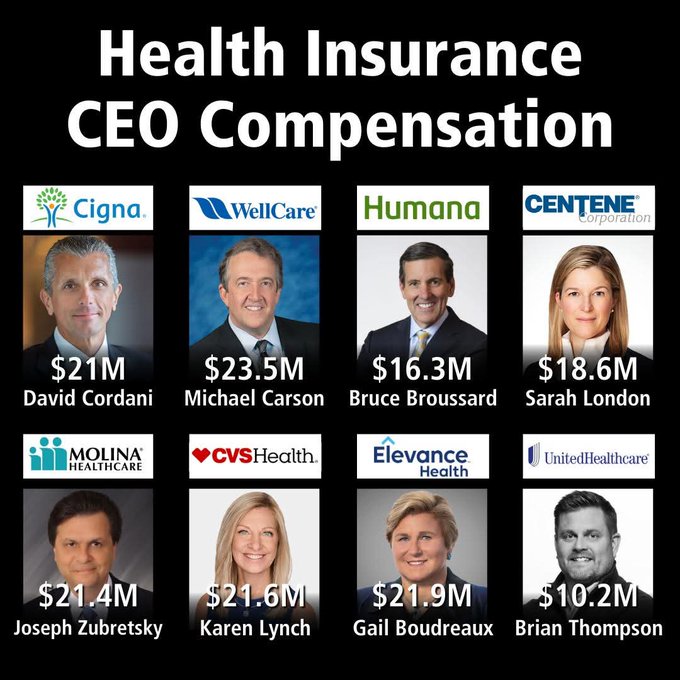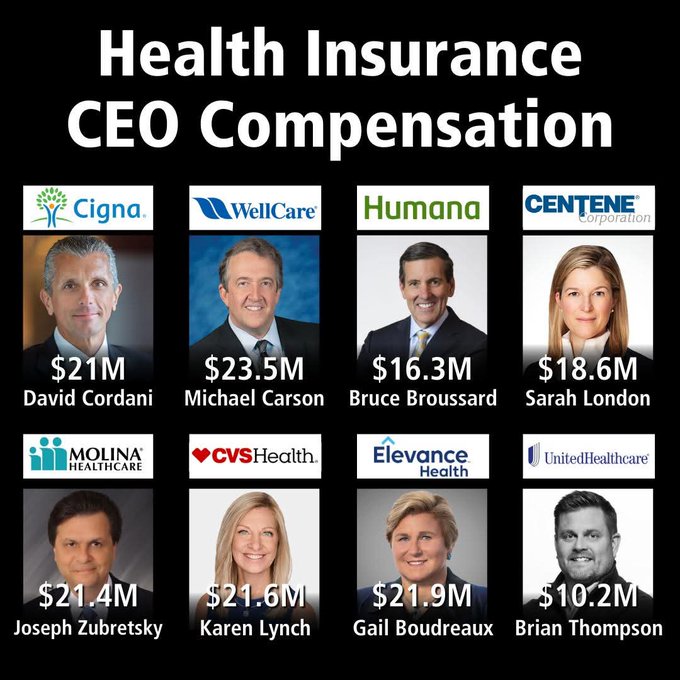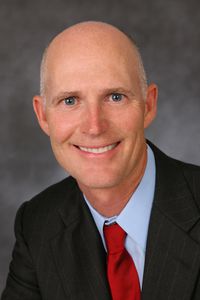A Bloomberg opinion writer today (Dec. 12, 2024) has decried “the breakdown in norms” regarding the positive public response to the murder of the health insurance company CEO.
However, Bloomberg columnists ignore that brazen predatory capitalism–including private equity, hedge funds, and real estate developers–is the new norm that the business community, politicians, and the media ignore.
The breakdown in business ethics and business practice norms is a genuine concern for most Americans. Is it normal for Trump’s cabinet to be a billionaires’ men’s club? Is it normal for the top 1% to own 54% of global wealth while the bottom 90% of people hold just 15%? Talk about perverted norms.
The state supports the wealth gap and the powerful lobbies that created it. That’s why dozens of heavily armed police and FBI accompanied the shackled Luigi Mangione, the accused shooter of the health insurance CEO. The heavy protection was a show of state force. It signaled to the business execs that CEOs are protected, even if their corporations continue to rip off the public flagrantly.
This is why the murder of the CEO of the $34 billion healthcare insurance company UnitedHealthcare in broad daylight in Midtown Manhattan is a stark lesson in corporate accountability and personal tragedy.
It is also a lesson about how Americans have reached the boiling point of being victimized by unaccountable, predatory corporations. 
It is not ironic that Brian Thompson was killed on his way to an investor meeting at a Midtown hotel by an unidentified gunman, who fits the description of an average American with health insurance.
The Thompson Murder Reeks of Ironies
The healthcare CEO was attending an investor-investor meeting where only financial topics were on the agenda. He was not at a medical or preventative disease meeting, but one focused on EBIDTA, profits and loss, insurance arcana, and future earnings projections. He was not going to anything concerned with preventative medicine or new drug releases that addressed diabetes, dementia, or new treatments for cancer or broken bones. This was strictly an orchestrated corporate dollars-and-cents financial presentation with videos, financial summaries, and a few live presentations from select top executives.
The UnitedHealthcare meeting probably would not discuss issues raised in the book Delay, Deny, Defend, which describes tactics used by insurers to deny claims. (The words “delay” and “depose” were written on a shell casing and a live round recovered in front of the New York Hilton Midtown, where UnitedHealth Group Inc. insurance chief Brian Thompson was fatally shot.)
They also would not discuss that UnitedHealthcare was among a group of companies slammed in a Senate report earlier this year for using automated tools to increase claim denials. According to ThinkAdvisor, the insurance unit Thompson managed is expected to bring in $280 billion in revenue this year and is the country’s largest health insurer.
And to state the obvious, “Law enforcement officials may look at whether it suggests a potential motive — anger against health insurers.” The American public does not need a motive. Many people who are seriously ill see if every time they have to pay a large deductible or are else denied coverage altogether.
And who benefits? This chart has the answer.

Another irony is that Thompson’s murder occurred a few days after the U.S. Supreme Court began hearing a case involving the rights of transgender young people to receive hormone treatment in certain states. These expensive treatments could presumably be covered by health insurance. But transgender treatment is a political-cultural minefield, so the case has attracted national attention more as a legal issue rather than a health care insurance one.
Another irony is that Trump seeks to appoint Robert Kennedy Jr., a weird anti-science, anti-vaccine advocate, as the head of the Department of Health and Human Services. This anti-science appointment comes at a time when contagious diseases (bird flu, polio, COVID variants) are recurring worldwide, and a global economy makes the spread of such contagions an international issue.
A fifth irony is that Thompson was murdered during the Medicare Advantage enrollment period that ends December 7. United Healthcare is a leading Medicare Advantage Plan provider. Medicare Advantage Plans, despite their name, are private insurance that have nothing to do with the Federal program called Medicare that began in 1965.
Traditional Medicare is a fee-for-service plan offered through the federal government. Medicare Advantage Plans started in 1996 and allow enrollees to receive their Medicare benefits from a private insurance plan that contracts with the federal government. The Balanced Budget Act of 1997 (BBA 97) created Medicare Part C—originally called Medicare+Choice, now known as Medicare Advantage as this arrangement evolved. Advantage Plans today are the poster child for corporate socialism.
The story of how these plans came into existence warrants a documentary. Still, the gist is that President Bill Clinton, a neoliberal, allowed the private insurance industry to feed the Federal money by providing health care to citizens only if the private insurance companies could access this federal money.
The political Trojan Horse they created was Medicare Advantage Plans. These plans allow people who get the Federal program for free to unwittingly give up their free access (excluding a minimal co-pay) to the federal plan by being duped into signing up for one offered by a private company (Humana, Aetna, Mutual of Omaha, United Health Care, CIGNA, and others) that wants them in their private network of medical providers.
The Medicare Advantage free-for-all is so lucrative that the healthcare industry spends hundreds of millions on advertising during the feeding frenzy enrollment period (from October 15 to December 7.)
As designed, the Medicare system does not have the budget to advertise to educate the public about these differences, so it gets looted by the private sector, which was precisely Bill Clinton’s intent. This explains the constant phone and mail solicitations from private industry health insurance salespeople.
According to KFF, “more than 85% of (cable TV) airings, or 9,500 ads per day, were for Medicare Advantage, the private plans that now enroll more than half of all eligible people with Medicare. Most of the remaining ads were for Medicare drug plans or Medicare supplemental insurance (Medigap).
“Ads rarely mentioned traditional Medicare or potential limitations with plan coverage, such as provider networks or prior authorization requirements, leaving beneficiaries with an incomplete view of their coverage options and tradeoffs. Open enrollment runs annually from October 15 to December 7, with advertising permitted to begin on October 1.”
The situation is so bad that the Senate Homeland Security investigative subcommittee examined “some of the nation’s largest Medicare Advantage insurers for their use of prior authorization and high rates of denials for certain types of care. The subcommittee sought documents and information from the three largest MA insurance companies — UnitedHealthcare, Humana, and CVS — and investigated their practice of “intentionally using prior authorization to boost profits by targeting costly yet critical stays in post-acute care facilities.”
The fourth irony is that Thompson was shot on December 4, one day after Anthem Blue Cross Blue Shield said it was reversing a policy change that would limit reimbursements for anesthesia during surgery and medical procedures. “The new policy would have reimbursed doctors based on time limits set by the insurer. Anthem BCBS, one of the largest health insurers in the U.S., quietly announced the new reimbursement policy last month for Connecticut, New York, and Missouri beginning in February. The policy change triggered outrage from the American Society of Anesthesiologists,” according to NBC.
Unfortunately, the “outrage” from the American Society of Anesthesiologists came one day too late for Thompson, who probably was insulated from anything to do with outrage from his millions of insureds.
Thompson’s Murder: A Form of Health Care Insurance Reform
“Outrage” is an appropriate word for the prevailing sentiment in the U.S. today.
Half the country is outraged by the election result, in which Trump won by a few thousand votes.
Outrage is also the sentiment many people voice when they see that Trump is filling his Cabinet with a menagerie of unqualified, compliant, white-collar criminals and billionaires.
Trump’s Cabinet aims to roll back regulation and privatize more of the Federal government, including Medicare, Medicaid, Medicare, and all Federal programs that deal with the healthcare industry. The health insurance industry, including United Health, will benefit from Trump’s libertarian policies, as it simultaneously victimizes millions of Americans.
Average citizen outrage is also evident on social media. The number of posts from people who did not mourn the murder of a healthcare CEO was so unexpected that it attracted the attention of the corporate New York Times and Bloomberg, which noted that public sentiment was solidly opposed to the for-profit healthcare insurance companies.
This anti-for-profit insurance sentiment is not new. Nor is there an anti-corporate sentiment against corporate polluters and other sectors of the advanced monopoly capital system that practice predatory capitalism. This includes private equity, hedge funds, and the real estate development industries, which all have lucrative tax loopholes, especially the ones for carried interest. 
Most Americans need to learn about predatory capitalism, and they cannot articulate how and why it evolved and operates freely today.
However, they certainly know its effects, such as lost jobs from private equity takeovers, less price competition in key industries, the rise in monopolies, and how multi-millionaires are created overnight through financial engineering wizardry without lifting a hammer or entering a factory.
The outrage also comes from watching how white-collar criminals walk free after committing felonies that victimize entire states as well as individuals. Trump, a convicted felon and rapist, walks free, and a ner-do-well like Hunter Biden capitalizes on his pedigree to make millions, evade taxes, and enjoy a luxurious lifestyle. Both Caucasian white-collar criminals will never go to jail.
But all this is old news, especially when it comes to defrauding the federal government’s various health care insurance programs. There are some good reasons why this type of fraud is so common:
- It involves a massive pile of money. Around 24% of the federal government’s budget is allocated towards healthcare, with major programs like Medicare, Medicaid, and the Children’s Health Insurance Program (CHIP)
- It’s relatively easy to do. In many cases, all you need to do is set up a lab and bill the government for tests that you may or may not have conducted.
- You have a good chance of never being prosecuted for the fraud.
One excellent example is the Medicare fraud involving the healthcare company HCA, which made a clean sweep of healthcare scams by defrauding Medicaid and military TRICARE at one time. HCA’s CEO at the time was Senator Rick Scott (R-Fla.).

Scott escaped prosecution (no surprise) and walked away with $300 million, making him one of the wealthiest people in Congress, and his entire fortune was based on stealing. Meanwhile, HCA (the shareholders) paid a $1.7 billion fine, ranking it the largest Medicare fraud in history.
True to form, the failed CEO Scott took his money, and because he was a Republican in Florida, a state that worships and welcomes fraudsters, he was elected governor and then Senator, where he endorsed privatizing Medicare and Social Security.
This takes guts, but Scott already made hundreds of millions from Medicare fraud, but he still wanted to capitalize on it if Medicare was privatized and he could collect a finder’s fee. )Note: some intrepid reporter should ask Scott what he thinks of the murder. His response would be predictable but interesting.)
Americans see this but are helpless to do anything. Then, a gunman kills the CEO of a healthcare company that makes $10 million annually and whose firm was publicly chastised in a Senate hearing for denying benefits to thousands of customers, and the police are looking for a motive. Really?
Reforming the Health System is Forbidden in Congress
Reforming the healthcare industry is forbidden in Congress, but the lone gunman and Hollywood think otherwise.
It is forbidden because the healthcare-pharmaceutical-medical-association lobby has more than 3,125 lobbyists in Washington. This is more people than there are in Congress. Even better, the lobbyists have lots of money: $562.3 million on entertainment, meals, seminars, trips, strip clubs, and junkets. No wonder people say we have the best government money can buy.
In the movie, “Dog Day Afternoon,” a desperate Al Pacino holds up a bank to fund his boyfriend’s sex change operation, chanting “Attica, Attica” to the sympathetic crowd that gathers outside the bank when Pacino’s motive becomes known. The movie “Network” has the famous chant “We’re not going to take it anymore” when anchorman Peter Finch rebels against the corporate management of the news.
But it may be that the film Spartacus best exemplifies the silent outrage many Americans feel about the condition of the nation today, including the bittersweet murder of a corporate healthcare CEO.
In the film, the enslaved people captured by the Romans chant, “We are all Spartacus,” when asked to give up Spartacus (Kirk Douglas) to the Romans who want to kill him. The outraged Americans are “All Spartacus.” They are captives of a system that tolerates unaccountable corporations, white-collar criminals, crony capitalism, and predatory financial industry daily activities. Looking ahead, Trump seeks to deregulate regulations and reverse laws that protect the health, safety, and anti-fraud provisions that can protect Americans if the systems work better.
The good news for Manhattan police is that they only have one suspect to catch, but the CEOs in corporate America and Congress should worry that there are millions of sympathizers for this crime.
Under Trump and his vendetta government, the system of protecting the Spartacus defenders will only get worse.
But for millions of Americans, this means “We are all Spartacus.











